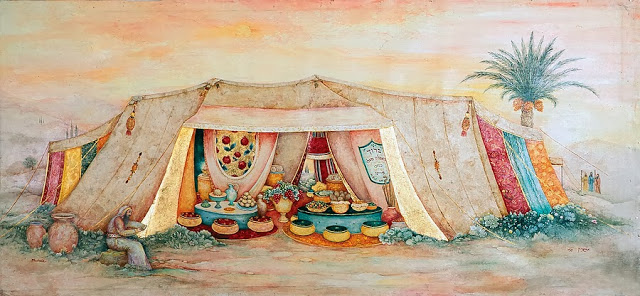Parashat Vayikra, the first portion of the book of Leviticus, is foreign to our modern ears, with its rules for animal sacrifice, detailed requirements for what to do with each type of animal for different offerings, and rules about eating the fat and the blood. How can we understand this ritual? Nancy Jay [see sources at end of paper] points out that the way to understand ritual is not to try and find a meaning identical to the ritual actors, but to build a kind of bridge, “not to accurately decode their meaning, but to make what they do and say intelligible for us.” One way to do this is to consider that the ritual of sacrifice as presented in Leviticus some 2500 year ago is a method of creating a holy routine – instructions about how to bring holiness into our lives through sacred norms. As modern Jews, we don’t bring order through sacrifice, but we do bring order through our own ritual practices.
Although this seems like a satisfying meaning, there is a drawback. Joy Laden writes “The emphasis on sacred normativity in Judaism and the Jewish community harms those, like LGBTQ Jews, who don’t fit established norms. It also harms the Torah by obscuring the queerness on which its moral and spiritual vitality depend.” This is worth exploring at greater length in a separate paper. For now, we observe the caution that the sacrificial ritual, performed by the priestly class, may in fact encode societal values such as a patrilineal and patriarchal system of bonding and identity (see Nancy Jay).
Having said that, there is another matter in Vayikra which is very interesting. The Parsha opens with these words:
And he called to Moses, and haKodesh spoke to him from the Tent of Meeting, saying: Speak to the children of Israel, and say to them: When a man from [among] you brings a sacrifice to haKodesh; from animals, from cattle or from the flock you shall bring your sacrifice. [Lev 1:1-2]
This is a curious thing and is the subject of much rabbinic commentary: why does God first call to Moses and then speak to him? Why did God not just speak to Moses? We need to go back to the ending of Exodus for context. As we close the book of Exodus, Moses has completed his work of directing the people of Israel to build their tabernacle in the dessert. Moses directed them in every bit of work, according to God’s command. Over and over Moses repeats that he did his work according to God’s command. The tabernacle has been decorated, the ark installed, the lamp set. Every minute task accomplished. And then the glory of the divine enters, leaving Moses outside.
And the cloud covered the tent of meeting, and the glory of haKodesh filled the Mishkan. Moses could not enter the tent of meeting because the cloud rested upon it and the glory of haKodesh filled the Mishkan. [Ex 40:34-5]
With Moses standing outside the tent, God calls to him. In discussing the rabbinic commentaries, Aviva Zornberg suggests several reasons why God called out to Moses before speaking to him. Perhaps God has a soft spot for Moses and wants him to join God in the tent; perhaps Moses was staying outside due to humility and therefore he merited to be called by God. Or perhaps Moses thought his work was done and therefore remained outside, but God had other ideas. In any event, Moses is charged with a new task, to teach the people how to offer their sacrifices in order to draw near to holiness. The word for sacrifice, korban, contains the notion of drawing near.
As discussed earlier, there is an upside to sacrifice (holy order) and a downside to sacrifice (establishment of normativity to the exclusion of LGBTQ and certainly other marginalized groups). But while we may be uncomfortable with the way in which normativity tends to “cast an aura of sanctity over flawed and even oppressive social structures (Joy Ladin),” I admit I am envious of the way in which Moses is called into the Tent. How often as folks who are queer, disabled, persons of color, or members of any group which is not mainstream, do we find that we are not called? Would it not be lovely if there were a person outside the big tent (our synagogues and shuls for instance) who loved our voices as God loved Moses’ and who actively called us in by name?
It is as if there is a house with a great dinner party in the neighborhood. The door is open, but it’s so full of light we hesitate to go in, for fear of being invisible and neglected. How different when the host comes out on the porch and calls us in, invites us to participate, and walks with us while tuning in to our particular dreams and celebrating our whole selves. Vayikra: and one called to each of us. Ken y’hi ratzon May it be so.
Jay, Nancy. Throughout Your Generations Forever: Sacrifice, Religion, and Paternity. Chicago: University of Chicago Press, 1992.
Ladin, Joy. “Both Wilderness and Promised Land: How Torah Grows When Read Through LTBTQ Eyes.” Tikkun 29, no. 4 (Fall 2014): 17–20.
Zornberg, Aviva. “Like Hearing the Grass Grow: Guilt, Atonement, Intimacy.” Lecture given May 17, 2017.
